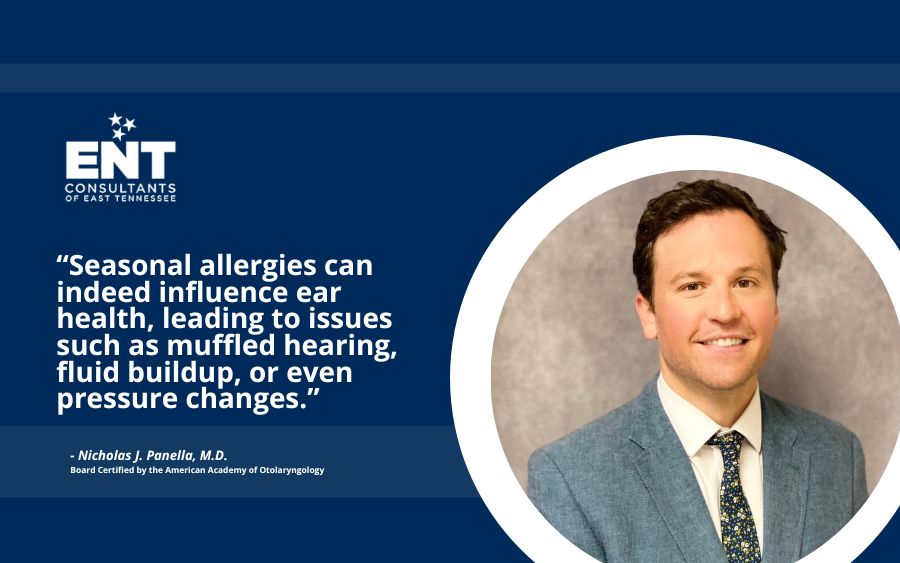Can Seasonal Allergies Affect Your Ears? What You Need to Know

|
Nicholas J. Panella
|
May 6, 2025
The arrival of allergy season is often marked by itchy eyes, sneezing fits, and endless nose blowing. The joys of pollen and spring!
However, if you've also noticed discomfort or changes in your ears during this time, you're not alone; seasonal allergies can indeed influence ear health, leading to issues such as muffled hearing, fluid buildup, or even pressure changes.
If you’re concerned about your hearing health as allergy season comes into fruition, you’re in the right place. There are some things to look out for with your seasonal allergies that might require a visit to a professional for further guidance.
Understanding the Connection Between Allergies and Your Ears
When allergens invade, your immune system responds by pumping out histamines to combat these foreign invaders. While this process is meant to protect you, it often causes inflammation, sneezing, and swelling, affecting more than just your nasal passages.
Your Eustachian tubes play a crucial role in equalizing ear pressure and draining fluid. Allergies can lead to inflammation of these tubes, making it difficult for them to function properly. This can cause uncomfortable pressure in your ears, leading to symptoms like a sense of fullness or popping.
Swelling and blocked passages can contribute to fluid retention in the middle ear. This is not only uncomfortable but can also increase the risk of ear infections, especially if pathogens are present in the retained fluid.
When there’s fluid in the middle ear or pressure is not balanced due to inflamed Eustachian tubes, sound waves struggle to reach the inner ear effectively, resulting in sounds that seem muted or distant.
Typical vs. Atypical Ear Symptoms During Allergy Season
While some ear issues are to be expected during allergy season, others may be cause for concern. Understanding the difference can help you decide if it’s time to consult with a hearing care professional.
Common Allergy Symptoms:
Ear congestion that fluctuates with your allergy symptoms
Intermittent, mild ear discomfort
Temporary changes in hearing clarity
Concerning Symptoms:
Severe ear pain or discomfort that doesn't leave with allergy treatment
Persistent, worsening muffled hearing
Fluid drainage from the ear or clear signs of infection
These more severe symptoms call for a closer look by a healthcare professional. You can rest assured that our team of ENT specialists can determine whether you're dealing with an ear infection or another condition worsened by your allergies.
How to Manage Ear Symptoms During Allergy Season
While allergy symptoms can be persistent, there are ways you can manage their impact on your ears:
Medication: Consult your physician about effective antihistamines or decongestants to combat allergy symptoms. These medications can minimize inflammation and help keep the Eustachian tubes clear.
Stay Hydrated: Drinking plenty of fluids can help thin mucus, easing its drainage and easing pressure on your ears.
Steam Inhalation: This can help open nasal passages, reducing congestion and ear pressure.
Monitor Pollen Levels: Limiting your exposure to high pollen levels can mitigate the severity of allergy symptoms.
Professional Intervention
Persistent or severe symptoms are best assessed by specialists. Whether it involves allergy-centered treatments or hearing aids, professional guidance can offer peace of mind and improved ear health.
Our team is well-equipped to offer insights into both allergy management and hearing health, ensuring that you receive the optimal treatment strategy.
By understanding and managing these symptoms effectively, you can reduce discomfort and prevent complications. Be vigilant about changes, and don’t hesitate to seek professional advice if your symptoms are more than just a seasonal nuisance.
Get in touch with our team via our website, or give us a call at (865) 693-6065.












